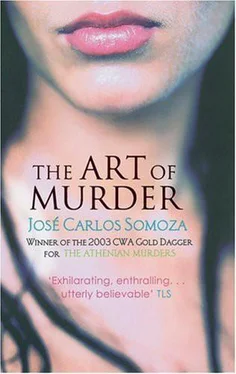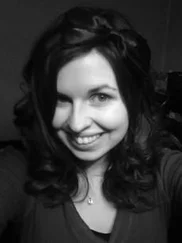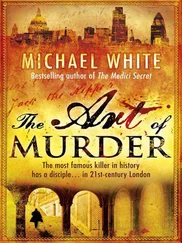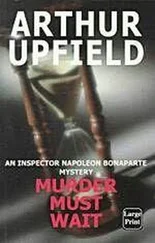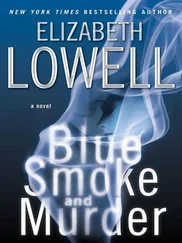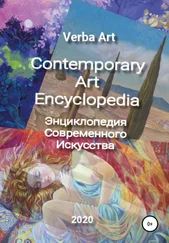Jose Somoza - Art of Murder
Здесь есть возможность читать онлайн «Jose Somoza - Art of Murder» весь текст электронной книги совершенно бесплатно (целиком полную версию без сокращений). В некоторых случаях можно слушать аудио, скачать через торрент в формате fb2 и присутствует краткое содержание. Жанр: Триллер, на английском языке. Описание произведения, (предисловие) а так же отзывы посетителей доступны на портале библиотеки ЛибКат.
- Название:Art of Murder
- Автор:
- Жанр:
- Год:неизвестен
- ISBN:нет данных
- Рейтинг книги:4 / 5. Голосов: 1
-
Избранное:Добавить в избранное
- Отзывы:
-
Ваша оценка:
- 80
- 1
- 2
- 3
- 4
- 5
Art of Murder: краткое содержание, описание и аннотация
Предлагаем к чтению аннотацию, описание, краткое содержание или предисловие (зависит от того, что написал сам автор книги «Art of Murder»). Если вы не нашли необходимую информацию о книге — напишите в комментариях, мы постараемся отыскать её.
Art of Murder — читать онлайн бесплатно полную книгу (весь текст) целиком
Ниже представлен текст книги, разбитый по страницам. Система сохранения места последней прочитанной страницы, позволяет с удобством читать онлайн бесплатно книгу «Art of Murder», без необходимости каждый раз заново искать на чём Вы остановились. Поставьте закладку, и сможете в любой момент перейти на страницу, на которой закончили чтение.
Интервал:
Закладка:
The instructions came directly from the Maestro, didn't they?' Clara would not take her yellow, primed brow and lashless eyes off Gerardo's face. 'And this morning's "leap into the void": Van Tysch was trying out an expression with me, wasn't he?' She was so desperately angry she almost choked. 'And you messed up the drawing. Completely. I was nearly drawn, nearly finished, and you…! You got hold of me, you crumpled me up, you made me a paper ball and tossed me in the shit.'
She thought she was crying, but realised her eyes were still dry. Gerardo's face had become a pallid mask. Trembling with rage, Clara went on:
'Congratulations, sweetheart.'
She turned on her heel and walked off towards the house. Now the wind was blowing at her from the other side. She heard Gerardo's voice further and further off, increasingly shrill. 'Clara!… Clara, come back, please… Listen to me…!'
She speeded up without looking back, until finally she could no longer hear him. Polygonal clouds began to obscure the early sun. When she reached the house, Uhl was out on the porch. He waved to stop her, and asked where Gerardo was. 'He's coming,' she muttered.
It was then she noticed just how Uhl was looking at her. His tiny, dioptrical eyes were blinking in their glass prisons. Clara realised he was very nervous. The painter spoke in his hesitant Spanish.
'Van Tysch secretary call now… Van Tysch come here.'
She felt dreadfully cold. She rubbed her arms energetically, but the chill did not diminish. She knew it had nothing to do with the fact that all she was wearing was the short robe that barely covered her thighs: she had been primed with a protective layer of acrylic gesso and, like every other professional canvas, was accustomed to more extreme temperatures. This cold was inside her, and directly related to the news she had just heard.
Van Tysch. Coming there. His arrival expected at any moment.
A canvas' emotions faced with the presence of a great maestro are hard to explain. Clara tried to think of a comparison but could not: no actor would feel overwhelmed by the shadow of a great director; no student would get cold shakes like this in the presence of a professor they admired.
My God, she really was shaking. To prevent Uhl realising her teeth were chattering, she went inside the house and walked up and down the living room. Then she took off the robe and went into a simple sketch pose, almost reaching a state of quiescence.
Opposite her on the wall was the photo of the man with his back to the camera.
People only knew about Van Tysch's appearance from the changing images shown in magazines and reports. Nor did Clara know anything definite about his way of life. Painters and paintings talked about him a lot, but, in fact, their opinions had little basis in reality. Yet Clara could clearly recall the impressions of those who had seen him. Vicky for example, who had taken part in some master classes he had given, said she had felt as though she were in the presence of an automaton, a thing without life of its own, a Frankenstein's monster created by the monster itself. 'But its creator forgot to breathe life into him,' she added. Two years earlier in Bilbao, Clara had met Gustavo Onfretti, who was on show at the Basque Country Guggenheim as Ferrucioli's Saint Sebastian, and had been painted by Van Tysch as another saint: Saint Stephen. She had asked him about his experience with the great painter of Edenburg. The Argentine model had gazed at her darkly for a long while before saying only: 'Van Tysch is your shadow.' Van Tysch. The Maestro. The shadow. He was coming.
She looked away from the photo and stared at the walls instead. She could see dull patches at the ceiling corners, and thought this must be where the cameras were hidden. She imagined Van Tysch studying his screen, pressing the keyboard, judging her expression and her worth as a canvas. She was annoyed with herself for not having thought of the possibility of hidden cameras before. A lot of painters used them: Brentano, Hobber, Ferrucioli… if she had known, or suspected it, she would have made a greater effort. Not that this would have been much use after the mess Gerardo had made of everything. What if Van Tysch was corning to sack her? What if he said to her (that is, if he spoke to her and not to his lackeys, because after all she was simply the material): 'I'm sorry, I've been thinking about it, and you're not the right person for this painting'? 'Calm down. Let it happen.'
Gerardo and Uhl had come into the room. They were storing paint pots in bags. Clara came out of her sketch position and looked at them.
'Are you leaving?' she asked in English. She did not much like the idea of having to face the Maestro on her own in the house.
'No, no we can't, we have to wait for him,' said Uhl. 'We're cleaning up a bit to create a good impression,' he added – or at least that's what Clara thought he said, because Uhl's English was very rapid. 'We have to wait to see if he wants us to continue in the same line or not. Perhaps he wants to do the sketching himself. Or perhaps
…' This was followed by a rapid burst of words that Clara did not catch. 'It could be anything. We have to be prepared. Sometimes…' He raised his eyebrows, spread his hands and puffed, as if to demonstrate that Van Tysch was unpredictable and they could only expect the worst. She did not really understand what he was trying to say, and was too scared to ask him to explain. 'Understand?' ‘Yes,' she said, lying in English.
Keep calm,' Uhl replied in Spanish. 'Everything's all right.' He's paying back my lie in Spanish, thought Clara. The shadow.
Points, lines, polygons, bodies. And last of all, the shading that defines the outlines, adds volume to the definitive shape.
When we are waiting for someone we do not know, we see them as a silhouette rising up in front of us. So we start drawing them, filling in the details, anticipating them. We are aware the whole time that we are making mistakes, that the real person will not be exactly the same as our outline, but we cannot get it out of our mind. Then it becomes a fetish, a simple representation of the object, a doll we can practise on. We place ourselves in front of it and weigh up our possible reactions. What should I say or do? Will he like me as I am? Should I smile and be friendly, or should I be cold towards him, keep my distance? Clara had already drawn her Van Tysch silhouette: she imagined him to be tall and thin, silent, with a piercing gaze. Without knowing why (perhaps because she remembered a couple of photos from magazines) she had added glasses, with broad lenses that would increase the size of his pupils. She had given him some defects as well, naturally, because she was terrified she might be disappointed. Van Tysch would be ugly. Van Tysch would be selfish. Van Tysch would be rude. Van Tysch would be brutal. Clara soon discovered she could easily forgive 'defects' such as these in a genius like him. She tried adding others that were less pardonable: a Van Tysch who was stupid, clumsy or vulgar. The last of these, a vulgar Van Tysch, was the worst thing she could think of.
Even so, she tried to imagine it. A Van Tysch who talked and thought like Jorge (My God!), who would calm her down, and who she could surprise. A mature Van Tysch next to whom she, at twenty-four, could feel superior. Or a Van Tysch like Gerardo, wet behind the ears, unsophisticated. She chastised herself with all these Van Tysches, like wearing a hair shirt. She used them as a penitence for the pleasure that the real person was bound to bring her.
She decided the morning would be one long vigil. She set up her headquarters in the kitchen: she could see the front of the house from its window. She preferred to devote her time to waiting rather than to pretend, as Gerardo and Uhl were (they were outside on the porch, chatting) that nothing was going on. At noon she took a vitamin Aroxen drink from the fridge, perforated the top with a straw, and began to sip it. The robe was still half-open over her crossed thighs. For some time she had been thinking about preparing herself in some form or other. Perhaps it would be better if she were completely naked? What if she painted some features on her face, or at least coloured her eyes in or outlined her lips in the shape of a smile? But wasn't she a blank sheet? Shouldn't she go on being one? She concluded it would be best for her to be as passive as possible.
Читать дальшеИнтервал:
Закладка:
Похожие книги на «Art of Murder»
Представляем Вашему вниманию похожие книги на «Art of Murder» списком для выбора. Мы отобрали схожую по названию и смыслу литературу в надежде предоставить читателям больше вариантов отыскать новые, интересные, ещё непрочитанные произведения.
Обсуждение, отзывы о книге «Art of Murder» и просто собственные мнения читателей. Оставьте ваши комментарии, напишите, что Вы думаете о произведении, его смысле или главных героях. Укажите что конкретно понравилось, а что нет, и почему Вы так считаете.
